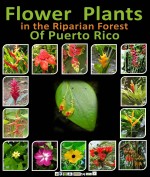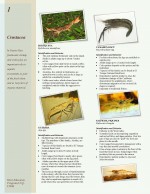In the last 10 years the Luquillo (LUQ) Long Term Ecological Research (LTER) program has developed and incorporated educational programs (the Schoolyard) and ecological curriculums (the Journey to El Yunque) that integrate teachers and students from the public school networks throughout the island of Puerto Rico. Other than these programs, few outreach activities or educational materials have been developed to assist and improve the general public’s knowledge and appreciation of the natural resources in their environment, especially those associated with the streams draining through the Luquillo Mountains.
Puerto Rico’s population has increased at a high rate with continued rapid growth projected. This growth in population and industry equates to a significant increase in both residential and industrial development and a corresponding decrease in habitat for wildlife. One of the most significant habitat alterations has been, and likely will be to wetlands and river systems. Puerto Rico has lost and continues to lose wetlands at an alarming rate. Watersheds and rivers located in the eastern portion of the island are especially important as they provide habitat for shrimp, fish and a plethora other wildlife; store floodwaters; recharge groundwater; filter nutrients, sediment, and other pollutants; and provide carbon to aquatic systems. It is, therefore, critical to educate the general public to protect the island's remaining streams and wetlands.
Studies and surveys (Kartchner 2003) conducted at El Yunque National Forest (EYNF) demonstrated that people have very little knowledge of aquatic fauna, although a few local residents are aware of commonly-recognized large shrimp, the freshwater crab and some types of fish. As would be expected, people who visit the streams and forest most frequently know more about the natural resources and the organisms found there than people who infrequently visit from the surrounding urban areas (Kratchner, 2003). Additionally, people still believe that the rivers on the island are infested with Schistosoma mansoni (bilharzias) and therefore should be avoided. Based on these studies and several interviews with students and general visitors to EYNF, LUQ LTER developed the River Education Program (REP).
The REP is a collaborative effort between LUQ-LTER, Utah State University, University of Puerto Rico, El Verde Field Station, Institute of Tropical Ecosystem Studies and the International Institute of Tropical Forestry. It is designed to provide students, educators, and the general public with the information and tools necessary to understand and analyze the health and function of the local streams, fostering a sense of ecological stewardship and importance among the neighbors of the El Yunque National Forest
The REP includes:
- Web Site, https://sites.google.com/a/ites.upr.edu/luquillo-lter/, incorporating pictures of freshwater animals from the rivers and streams, their ecological information, such as life cycle and distribution, and benefits to the ecosystem. The web page includes a compilation of all the scientific articles related to the research in the area and a glossary with terms and concepts about hydrology, limnology and freshwater ecology. It is a resource for ecology students at all levels and will lead them to a better understanding of ecology. For example, they will be able to describe how the detrital dynamics are affected by the species composition and the abundance of shrimp, fish, and snails in these streams; how this assemblage varies with elevation; and how they are impacted by floods and droughts, and by water diversion and damming, all of which impede the upstream migration of biological life that live in the streams. In particular, water diversion impoverishes aquatic fauna and reduces water quality, and has a negative economic impact within the geographic area.
- Biological Fact Sheets Series that include general information for lay audiences about biological life cycles, species interactions, ecosystems, and the impact that humans have on these. The fact sheets include color pictures and easy diagrams to complement the written information. Along with the fact sheets are medium sized posters highlighting the freshwater species, their common and scientific names, and their taxonomic groupings. The purpose of these fact sheets is to make it easy for readers to understand what’s going on in their environment and to take appropriate action to safeguard it.
- Workshops focusing on the aquatic fauna specifically targeted to technicians, teachers, and students who work with LUQ-LTER or collaborate in some of the research projects conducted by various universities at El Verde.
Literature cited:
Kartchner, S.C. 2003. Recreational Shrimping in Montane Streams of the Puerto Rico. Acta Científica 17(1-3):39-57.

 Enlarge this image
Enlarge this image
